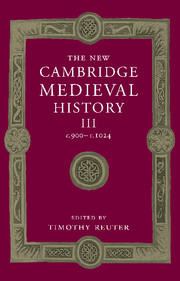Book contents
- Frontmatter
- 1 Introduction: reading the tenth century
- PART I GENERAL THEMES
- PART II POST-CAROLINGIAN EUROPE
- PART III NON-CAROLINGIAN EUROPE
- 19 European Russia, c. 500–c. 1050
- 20 Bohemia and Poland: two examples of successful western Slavonic state-formation
- 21 Hungary
- 22 Byzantium in equilibrium, 886–944
- 23 Bulgaria: the other Balkan ‘empire’
- 24 Byzantium expanding, 944–1025
- 25 Byzantium and the West
- 26 Southern Italy in the tenth century
- 27 Sicily and al-Andalus under Muslim rule
- 28 The Spanish kingdoms
- Appendix genealogical tables
- List of primary sources
- Bibliography of secondary works arranged by chapter
- Index
- Frontispiece
- Plate section
- Map 2: Archbishoprics and bishoprics in the early eleventh century
- Map 4: Germany
- Map 13: Byzantium in 1025
- References
23 - Bulgaria: the other Balkan ‘empire’
from PART III - NON-CAROLINGIAN EUROPE
Published online by Cambridge University Press: 28 March 2008
- Frontmatter
- 1 Introduction: reading the tenth century
- PART I GENERAL THEMES
- PART II POST-CAROLINGIAN EUROPE
- PART III NON-CAROLINGIAN EUROPE
- 19 European Russia, c. 500–c. 1050
- 20 Bohemia and Poland: two examples of successful western Slavonic state-formation
- 21 Hungary
- 22 Byzantium in equilibrium, 886–944
- 23 Bulgaria: the other Balkan ‘empire’
- 24 Byzantium expanding, 944–1025
- 25 Byzantium and the West
- 26 Southern Italy in the tenth century
- 27 Sicily and al-Andalus under Muslim rule
- 28 The Spanish kingdoms
- Appendix genealogical tables
- List of primary sources
- Bibliography of secondary works arranged by chapter
- Index
- Frontispiece
- Plate section
- Map 2: Archbishoprics and bishoprics in the early eleventh century
- Map 4: Germany
- Map 13: Byzantium in 1025
- References
Summary
the history of Byzantium in this period cannot be divorced from that of Bulgaria, with which it shared borders for over 1,000 kilometres. The accord of 870 between Khan Boris and Emperor Basil I conceded Bulgaria an archbishopric of its own, ‘autocephalous’ but under the moral lead of the patriarchate of Constantinople; the archbishop was high in the order of precedence of imperial court banquets. The Byzantine ruling elite enshrined the notion of Bulgaria’s religious indebtedness in the fiction that the Bulgarians were the ‘spiritual children’ of the Byzantines, while each successive Bulgarian ruler was the ‘spiritual child’ of the emperor and the patriarch.
After major expansion westwards in the mid-ninth century and the subsequent establishment of metropolitanates and bishoprics, Bulgaria constituted a large, populous and well-ordered power. Its newly Christian rulers were committed to abhor warfare against fellow-Christians and especially against their ‘spiritual father’, but their polity aroused apprehension on the Bosphorus. The various clashes between Symeon (893–927) and Byzantium might seem to vindicate such unease. But the colourful career of Symeon has deflected attention away from the problems inherent in Byzantino-Bulgarian relations, and tensions are also discernible during the reign of his eirenic son, Peter; the personalities of individual rulers were by no means the sole determinant of relations.
The events of Symeon’s reign are narrated relatively fully by Byzantine sources, and these have swayed modern historians’ appraisals of his aspirations. Already before 913 ‘not a few persons were … whispering’ that he intended to seize the Byzantine throne, according to a letter of Patriarch Nikolaos Mystikos ostensibly urging him against such a course. Yet Symeon could be described by Theophylact of Ochrid, a much later Byzantine church-man writing in Bulgaria, as one who ‘showed most fervent trust in those manifesting purity of morals and a most Christian way of life’; he had ‘extended the holy preaching of the Gospel and through his foundation of churches everywhere established orthodoxy as unassailable’.
Keywords
- Type
- Chapter
- Information
- The New Cambridge Medieval History , pp. 567 - 585Publisher: Cambridge University PressPrint publication year: 2000
References
- 5
- Cited by

